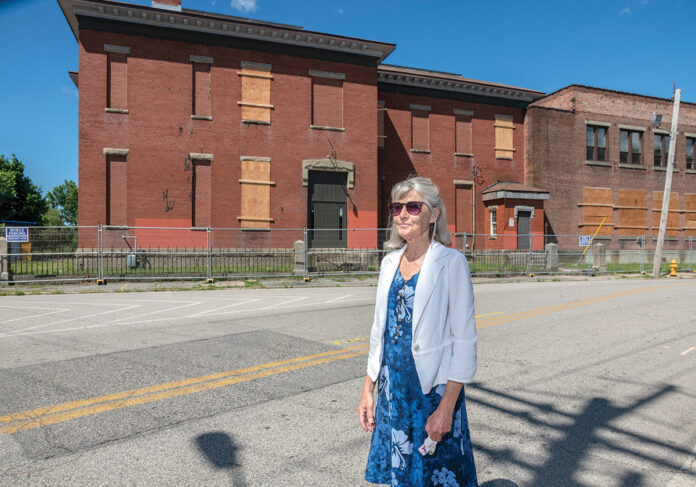When Eric DaRosa’s family opened North East Knitting Inc. on Conant Street in Pawtucket, the neighborhood was in rough shape.
Many of the historic mill buildings around them were empty. There were smashed windows and trash strewn about. The parking lot across the street was dirt and trash.
“You wouldn’t be caught walking down the street,” DaRosa recalled of the atmosphere when his family business set up shop in 1986.
Today, it’s a different story. The parking lot has been paved and many once-vacant buildings are now buzzing with activity – renovated loft-style apartments, a brewery and event space, and, in DaRosa’s building, two fitness centers.
“What gets me now is seeing kids walking across the street here to do karate lessons,” DaRosa said. “You would never see kids here before.”
And with the construction of a new commuter rail and bus station slated to be completed in summer 2022 in what has been dubbed the Conant Thread District – named after a sprawling textile company that once occupied the area – DaRosa sees even more opportunity.
“It might be the new Boston,” he said.
But his optimism also comes with a nagging worry that the development dreams might fall short, just as they did with a new train station in North Kingstown.
‘To see the work happening … I think we’re going to start to see private investors come in.’
DONALD R. GREBIEN, Pawtucket mayor
How the story will end for Pawtucket is unclear, with redevelopment still a work in progress. Exactly how much of the 4 million square feet of space available in the district along the Central Falls border – including existing, underutilized space, as well as developable land – is still waiting for a new or better use is unclear.
Over the last five years, the cities of Pawtucket and Central Falls have ramped up efforts to reinvent the space through zoning changes, financial incentive programs and marketing to entice developers. During that time, new construction or renovation plans have materialized for about 22.4 acres, according to Pawtucket Mayor Donald R. Grebien’s office. Grebien estimated more than half of the 150-acre area still hasn’t been targeted for redevelopment.
The mayor blamed the limited interest on the long, often bureaucratic process that accompanies government work – the Pawtucket Central Falls Transit Center at the heart of the neighborhood redevelopment has been brewing for decades but only got off the ground recently.
“The stigma is, is this really going to happen?” Grebien said. “Now, to see the work happening, to be able to touch and feel, I think we’re going to start to see private investors come in.”
Indeed, the prospect of train and bus riders coming to and from the district was a selling point to Lee Peyser, founder of New Jersey-based Peyser Real Estate Group LLC. The company has planned a $44 million mixed-use project for one of the abandoned mill buildings on Dexter Street, just a block away from the future train station.
Peyser credited the city and the state for “stepping up” to make the deal workable – offering $3 million in tax credits from R.I. Commerce Corp., plus a break on initial city property taxes, among other incentives.
“Rhode Island is a new market for us, but we like transit-oriented development and are really focused on opportunity zones,” Peyser said. “Doing our due diligence on this proposal, it made a lot of sense for us.”
However, the project has suffered setbacks, namely in rising costs of materials such as lumber due to pandemic shortages. Peyser now estimates the project won’t be finished until 2023.
Another major blow to redevelopment occurred when a fiery inferno torched another 12 acres of old mill buildings in March 2020. The property owner, Urban Smart Growth LLC, which also developed Hope Artiste Village, was planning to redevelop the properties in a live-work, mixed-use project, according to Jan Brodie, executive director for the Pawtucket Foundation. Those plans are now off the table, with any future development on hold while the company fights over insurance coverage for its losses in court, according to Lance Robbins, general manager for Urban Smart Growth.
Still, Brodie, who led the charge for policy changes and marketing to incentivize the development of the area, was optimistic. These types of changes take time, she said.
“We never intended that in two years everything was going to be filled,” she said.
She added that the pent-up demand for housing will help spur future projects. Retail and commercial space is needed too, but “you can’t put a store up if there are no people around,” Brodie said.
That is, in some ways, exactly what Jeremy Duffy did. The co-founder of Isle Brewers Guild LLC bought a Main Street mill building in 2015, just before the Conant Thread District was officially established. The guild originally planned to house the brewing and distribution center in the Valley neighborhood of Providence, but it had to find an alternative after a fire burned down the building in which they planned to occupy.
Still, the Pawtucket space’s affordable price tag and high ceilings suited to a brewery were enticing, despite what Duffy acknowledged were “dilapidated” surroundings.
That’s no longer the case, he said, describing the transformation of several loft apartment projects around his property. The Guild, too, has expanded, with a taproom, event space and a regional reputation that drew 85,000 visitors in 2019.
Duffy predicted a “massive explosion” of development once the train station opens in 2022, pointing to similar success in other areas that have built new stations and platforms.
“I think a lot of the buildup during COVID is going to start happening now,” he said.
Nancy Lavin is a PBN staff writer. Contact her at Lavin@PBN.com.












